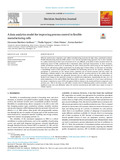JavaScript is disabled for your browser. Some features of this site may not work without it.
| dc.contributor.author | Martínez-Arellano, Giovanna | |
| dc.contributor.author | Nguyen, ThuBa | |
| dc.contributor.author | Hinton, Chris | |
| dc.contributor.author | Ratchev, Svetan | |
| dc.date.accessioned | 2022-06-23T14:55:06Z | |
| dc.date.available | 2022-06-23T14:55:06Z | |
| dc.date.issued | 2022-06-02 | |
| dc.identifier.citation | Martinez-Arellano G, Nguyen T, Hinton C, Ratchev S. (2022) A data analytics model for improving process control in flexible manufacturing cells, Decision Analytics Journal, Volume 3, June 2022, Article number 100075 | en_UK |
| dc.identifier.issn | 2772-6622 | |
| dc.identifier.uri | https://doi.org/10.1016/j.dajour.2022.100075 | |
| dc.identifier.uri | https://dspace.lib.cranfield.ac.uk/handle/1826/18058 | |
| dc.description.abstract | With the need of more responsive and resilient manufacturing processes for high value, customised products, Flexible Manufacturing Systems (FMS) remain a very relevant manufacturing approach. Due to their complexity, quality monitoring in these types of systems can be very difficult, particularly in those scenarios where the monitoring cannot be fully automated due to functional, safety and legal characteristics. In these scenarios, quality practitioners concentrate on monitoring the most critical processes and leaving out the inspection of those that are still meeting quality requirements but showing signs of future failure. In this paper we introduce a methodology based on data analytics that simplifies the monitoring process for the operator, allowing the practitioner to concentrate on the relevant issues, anticipate out of control processes and take action. By identifying a reference model or best performing machine, and the occurring patterns in the quality data, the presented approach identifies the adjustable processes that are still in control, allowing the practitioner to decide if any changes in the machine’s settings are needed (tool replacement, repositioning the axis, etc.). An initial deployment of the tool at BMW Plant Hams Hall to monitor a focussed set of part types and features has shown a reduction in scrap of 97% throughout 2020 in relation to the monitored features compared to the previous year. This in the long run will reduce reaction time in following quality control procedure, reduce significant scrap costs and ultimately reduce the need for measurements and enable more output in terms of volume capacity. | en_UK |
| dc.description.sponsorship | Engineering and Physical Sciences Research Council (EPSRC): EP/R511730/1 and EP/R032777/1 | en_UK |
| dc.language.iso | en | en_UK |
| dc.publisher | Elsevier | en_UK |
| dc.rights | Attribution 4.0 International | * |
| dc.rights.uri | http://creativecommons.org/licenses/by/4.0/ | * |
| dc.subject | Flexible manufacturing systems | en_UK |
| dc.subject | Statistical process control | en_UK |
| dc.subject | Data analytics | en_UK |
| dc.subject | Data visualisation | en_UK |
| dc.title | A data analytics model for improving process control in flexible manufacturing cells | en_UK |
| dc.type | Article | en_UK |
Files in this item
The following license files are associated with this item:
This item appears in the following Collection(s)
-
Staff publications (SATM) [4380]

